- Home
- Arthur Ransome
The Firebird and Other Russian Fairy Tales Page 2
The Firebird and Other Russian Fairy Tales Read online
Page 2
“That’s as may be,” says she, and they fell asleep.
And in the middle of the night Sadko happened to turn in bed, and he touched the Princess with his left foot, and she was cold, cold, cold as ice in January. And with that touch of cold he woke, and he was lying under the walls of Novgorod, with his dulcimer in his hand, and one of his feet was in the little river Volkhov, and the moon was shining.
After that some say he went into the town, and lived on alone until he died. Others say that he took his dulcimer and swam out into the middle of the river, and sank under water again, looking for his little Princess. They say he found her, and lives still in the green palaces of the bottom of the sea; and when there is a big storm, you may know that Sadko is playing on his dulcimer and singing, and that the Tzar of the Sea is dancing his tremendous dance down there, on the bottom, under the waves.
Frost
ONCE UPON a time there were an old man and an old woman. Now the old woman was the old man’s second wife. His first wife had died, and had left him with a little daughter: Martha she was called. Then he married again, and God gave him a cross wife, and with her two more daughters, and they were very different from the first.
The old woman loved her own daughters, and gave them red kisel jelly every day, and honey too, as much as they could put into their greedy little mouths. But poor little Martha, the eldest, she got only what the others left. When they were cross they threw away what they left, and then she got nothing at all.
The children grew older, and the stepmother made Martha do all the work of the house. She had to fetch the wood for the stove, and light it and keep it burning. She had to draw the water for her sisters to wash their hands in. She had to make the clothes, and wash them and mend them. She had to cook the dinner, and clean the dishes after the others had done before having a bite for herself.
For all that the stepmother was never satisfied, and was for ever shouting at her: “Look, the kettle is in the wrong place;” “There is dust on the floor;” “There is a spot on the tablecloth;” or, “The spoons are not clean, you stupid, ugly, idle hussy.” But Martha was not idle. She worked all day long, and got up before the sun, while her sisters never stirred from their beds till it was time for dinner. And she was not stupid. She always had a song on her lips, except when her stepmother had beaten her. And as for being ugly, she was the prettiest little girl in the village.
Her father saw all this, but he could not do anything, for the old woman was mistress at home, and he was terribly afraid of her. And as for the daughters, they saw how their mother treated Martha, and they did the same. They were always complaining and getting her into trouble. It was a pleasure to them to see the tears on her pretty cheeks.
Well, time went on, and the little girl grew up, and the daughters of the stepmother were as ugly as could be. Their eyes were always cross, and their mouths were always complaining. Their mother saw that no one would want to marry either of them while there was Martha about the house, with her bright eyes and her songs and her kindness to everybody.
So she thought of a way to get rid of her stepdaughter, and a cruel way it was.
“See here, old man,” says she, “it is high time Martha was married, and I have a bridegroom in mind for her. To-morrow morning you must harness the old mare to the sledge, and put a bit of food together and be ready to start early, as I’d like to see you back before night.”
To Martha she said: “To-morrow you must pack your things in a box, and put on your best dress to show yourself to your betrothed.”
“Who is he?” asked Martha with red cheeks.
“You will know when you see him,” said the stepmother.
All that night Martha hardly slept. She could hardly believe that she was really going to escape from the old woman at last, and have a hut of her own, where there would be no one to scold her. She wondered who the young man was. She hoped he was Fedor Ivanovitch, who had such kind eyes, and such nimble fingers on the balalaika, and such a merry way of flinging out his heels when he danced the Russian dance. But although he always smiled at her when they met, she felt she hardly dared to hope that it was he. Early in the morning she got up and said her prayers to God, put the whole hut in order, and packed her things into a little box. That was easy, because she had such few things. It was the other daughters who had new dresses. Any old thing was good enough for Martha. But she put on her best blue dress, and there she was, as pretty a little maid as ever walked under the birch trees in spring.
The old man harnessed the mare to the sledge and brought it to the door. The snow was very deep and frozen hard, and the wind peeled the skin from his ears before he covered them with the flaps of his fur hat.
“Sit down at the table and have a bite before you go,” says the old woman.
The old man sat down, and his daughter with him, and drank a glass of tea and ate some black bread. And the old woman put some cabbage soup, left from the day before, in a saucer, and said to Martha, “Eat this, my little pigeon, and get ready for the road.” But when she said “my little pigeon,” she did not smile with her eyes, but only with her cruel mouth, and Martha was afraid. The old woman whispered to the old man: “I have a word for you, old fellow. You will take Martha to her betrothed, and I’ll tell you the way. You go straight along, and then take the road to the right into the forest . . . you know . . . straight to the big fir tree that stands on a hillock, and there you will give Martha to her betrothed and leave her. He will be waiting for her, and his name is Frost.”
The old man stared, opened his mouth, and stopped eating. The little maid, who had heard the last words, began to cry.
“Now, what are you whimpering about?” screamed the old woman. “Frost is a rich bridegroom and a handsome one. See how much he owns. All the pines and firs are his, and the birch trees. Any one would envy his possessions, and he himself is a very bogatir,1 a man of strength and power.”
The old man trembled, and said nothing in reply. And Martha went on crying quietly, though she tried to stop her tears. The old man packed up what was left of the black bread, told Martha to put on her sheepskin coat, set her in the sledge and climbed in, and drove off along the white, frozen road.
The road was long and the country open, and the wind grew colder and colder, while the frozen snow blew up from under the hoofs of the mare and spattered the sledge with white patches. The tale is soon told, but it takes time to happen, and the sledge was white all over long before they turned off into the forest.
They came in the end deep into the forest, and left the road, and over the deep snow through the trees to the great fir. There the old man stopped, told his daughter to get out of the sledge, set her little box under the fir, and said, “Wait here for your bridegroom, and when he comes be sure to receive him with kind words.” Then he turned the mare round and drove home, with the tears running from his eyes and freezing on his cheeks before they had had time to reach his beard.
The little maid sat and trembled. Her sheepskin coat was worn through, and in her blue bridal dress she sat, while fits of shivering shook her whole body. She wanted to run away; but she had not strength to move, or even to keep her little white teeth from chattering between her frozen lips.
Suddenly, not far away, she heard Frost crackling among the fir trees. He was leaping from tree to tree, crackling as he came.
He leapt at last into the great fir tree, under which the little maid was sitting. He crackled in the top of the tree, and then called down out of the topmost branches,—
“Are you warm, little maid?”
“Warm, warm, little Father Frost.”
Frost laughed, and came a little lower in the tree and crackled and crackled louder than before. Then he asked,—
“Are you still warm, little maid? Are you warm, little red cheeks?”
The little maid could hardly speak. She was nearly dead, but she answered,—
“Warm, dear Frost; warm, little father.”
Frost climbed lower in th
e tree, and crackled louder than ever, and asked,—
“Are you still warm, little maid? Are you warm, little red cheeks? Are you warm, little paws?”
The little maid was benumbed all over, but she whispered so that Frost could just hear her,—
“Warm, little pigeon, warm, dear Frost.”
And Frost was sorry for her, leapt down with a tremendous crackle and a scattering of frozen snow, wrapped the little maid up in rich furs, and covered her with warm blankets.
In the morning the old woman said to her husband, “Drive off now to the forest, and wake the young couple.”
The old man wept when he thought of his little daughter, for he was sure that he would find her dead. He harnessed the mare, and drove off through the snow. He came to the tree, and heard his little daughter singing merrily, while Frost crackled and laughed. There she was, alive and warm, with a good fur cloak about her shoulders, a rich veil, costly blankets round her feet, and a box full of splendid presents.
The old man did not say a word. He was too surprised. He just sat in the sledge staring, while the little maid lifted her box and the box of presents, set them in the sledge, climbed in, and sat down beside him.
They came home, and the little maid, Martha, fell at the feet of her stepmother. The old woman nearly went off her head with rage when she saw her alive, with her fur cloak and rich veil, and the box of splendid presents fit for the daughter of a prince.
“Ah, you chit,” she cried, “you won’t get round me like that!”
And she would not say another word to the little maid, but went about all day long biting her nails and thinking what to do.
There she was, alive and warm, with a good fur cloak about her shoulders.
At night she said to the old man,—
“You must take my daughters, too, to that bridegroom in the forest. He will give them better gifts than these.”
Things take time to happen, but the tale is quickly told. Early next morning the old woman woke her daughters, fed them with good food, dressed them like brides, hustled the old man, made him put clean hay in the sledge and warm blankets, and sent them off to the forest.
The old man did as he was bid—drove to the big fir tree, set the boxes under the tree, lifted out the stepdaughters and set them on the boxes side by side, and drove back home.
They were warmly dressed, these two, and well fed, and at first, as they sat there, they did not think about the cold.
“I can’t think what put it into mother’s head to marry us both at once,” said the first, “and to send us here to be married. As if there were not enough young men in the village. Who can tell what sort of fellows we shall meet here!”
Then they began to quarrel.
“Well,” says one of them, “I’m beginning to get the cold shivers. If our fated ones do not come soon, we shall perish of cold.”
“It’s a flat lie to say that bridegrooms get ready early. It’s already dinner-time.”
“What if only one comes?”
“You’ll have to come another time.”
“You think he’ll look at you?”
“Well, he won’t take you, anyhow.”
“Of course he’ll take me.”
“Take you first! It’s enough to make any one laugh!”
They began to fight and scratch each other, so that their cloaks fell open and the cold entered their bosoms.
Frost, crackling among the trees, laughing to himself, froze the hands of the two quarrelling girls, and they hid their hands in the sleeves of their fur coats and shivered, and went on scolding and jeering at each other.
“Oh, you ugly mug, dirty nose! What sort of a housekeeper will you make?”
“And what about you, boasting one? You know nothing but how to gad about and lick your own face. We’ll soon see which of us he’ll take.”
And the two girls went on wrangling and wrangling till they began to freeze in good earnest.
Suddenly they cried out together,—
“Devil take these bridegrooms for being so long in coming! You have turned blue all over.”
And together they replied, shivering,—
“No bluer than yourself, tooth-chatterer.”
And Frost, not so far away, crackled and laughed, and leapt from fir tree to fir tree, crackling as he came.
The girls heard that some one was coming through the forest.
“Listen! there’s some one coming. Yes, and with bells on his sledge!”
“Shut up, you chit! I can’t hear, and the frost is taking the skin off me.”
They began blowing on their fingers.
And Frost came nearer and nearer, crackling, laughing, talking to himself. Nearer and nearer he came, leaping from tree-top to tree-top, till at last he leapt into the great fir under which the two girls were sitting and quarrelling.
He leant down, looking through the branches, and asked,—
“Are you warm, maidens? Are you warm, little red cheeks? Are you warm, little pigeons?”
“Ugh, Frost, the cold is hurting us. We are frozen. We are waiting for our bridegrooms, but the cursed fellows have not turned up.”
Frost came a little lower in the tree, and crackled louder and swifter.
“Are you warm, maidens? Are you warm, my little red cheeks?”
“Go to the devil!” they cried out. “Are you blind? Our hands and feet are frozen!”
Frost came still lower in the branches, and cracked and crackled louder than ever.
“Are you warm, maidens?” he asked.
“Into the pit with you, with all the fiends,” the girls screamed at him, “you ugly, wretched fellow!” . . . And as they were cursing at him their bad words died on their lips, for the two girls, the cross children of the cruel stepmother, were frozen stiff where they sat.
Frost hung from the lowest branches of the tree, swaying and crackling while he looked at the anger frozen on their faces. Then he climbed swiftly up again, and crackling and cracking, chuckling to himself, he went off, leaping from fir tree to fir tree, this way and that through the white, frozen forest.
In the morning the old woman says to her husband, —
“Now then, old man, harness the mare to the sledge, and put new hay in the sledge to be warm for my little ones, and lay fresh rushes on the hay to be soft for them; and take warm rugs with you, for maybe they will be cold, even in their furs. And look sharp about it, and don’t keep them waiting. The frost is hard this morning, and it was harder in the night.”
The old man had not time to eat even a mouthful of black bread before she had driven him out into the snow. He put hay and rushes and soft blankets in the sledge, and harnessed the mare, and went off to the forest. He came to the great fir, and found the two girls sitting under it dead, with their anger still to be seen on their frozen, ugly faces.
He picked them up, first one and then the other, and put them in the rushes and the warm hay, covered them with the blankets, and drove home.
The old woman saw him coming, far away, over the shining snow. She ran to meet him, and shouted out,—
“Where are the little ones?”
“In the sledge.”
She snatched off the blankets and pulled aside the rushes, and found the bodies of her two cross daughters.
Instantly she flew at the old man in a storm of rage. “What have you done to my children, my little red cherries, my little pigeons? I will kill you with the oven fork! I will break your head with the poker!”
The old man listened till she was out of breath and could not say another word. That is the only wise thing to do when somebody is in a scolding rage. And as soon as she had no breath left with which to answer him, he said,—
“My little daughter got riches for soft words, but yours were always rough of the tongue. And it’s not my fault, anyhow, for you yourself sent them into the forest.”
Well, at last the old woman got her breath again, and scolded away till she was tired out. But in the end she mad
e her peace with the old man, and they lived together as quietly as could be expected.
As for Martha, Fedor Ivanovitch sought her in marriage, as he had meant to do all along—yes, and married her; and pretty she looked in the furs that Frost had given her. And she had the prettiest children that ever were seen—yes, and the best behaved. For if ever they thought of being naughty, the old grandfather told them the story of crackling Frost, and how kind words won kindness, and cross words cold treatment.
The Three Men of Power
LONG AGO there lived a King, and he had three daughters, the loveliest in all the world. He loved them so well that he built a palace for them underground, lest the rough winds should blow on them or the red sun scorch their delicate faces. A wonderful palace it was, down there underground, with fountains and courts, and lamps burning, and precious stones glittering in the light of the lamps. And the three lovely princesses grew up in that palace underground, and knew no other light but that of the coloured lanterns, and had never seen the broad world that lies open under the sun by day and under the stars by night. Indeed, they did not know that there was a world outside those glittering walls, above that shining ceiling, carved and gilded and set with precious stones.
But it so happened that among the books that were given them to read was one in which was written of the world: how the sun shines in the sky; how trees grow green; how the grass waves in the wind and the leaves whisper together; how the rivers flow between their green banks and through the flowery meadows, until they come to the blue sea that joins the earth and the sky. They read in that book of white-walled towns, of churches with gilded and painted domes, of the brown wooden huts of the peasants, of the great forests, of the ships on the rivers, and of the long roads with the folk moving on them, this way and that, about the world.
And when the King came to see them, as he was used to do, they asked him,—
“Father, is it true that there is a garden in the world?”
“Yes,” said the King.
“And green grass?”

 Peter Duck: A Treasure Hunt in the Caribbees
Peter Duck: A Treasure Hunt in the Caribbees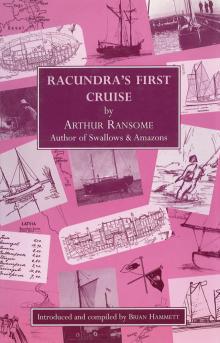 Racundra's First Cruise
Racundra's First Cruise Great Northern?
Great Northern? Swallowdale
Swallowdale Swallows and Amazons
Swallows and Amazons Winter Holiday
Winter Holiday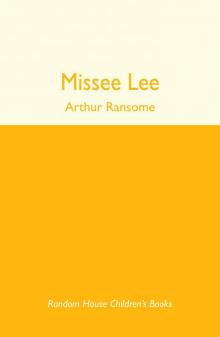 Missee Lee: The Swallows and Amazons in the China Seas
Missee Lee: The Swallows and Amazons in the China Seas Pigeon Post
Pigeon Post We Didn't Mean to Go to Sea
We Didn't Mean to Go to Sea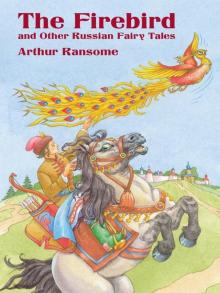 The Firebird and Other Russian Fairy Tales
The Firebird and Other Russian Fairy Tales Coot Club
Coot Club The Big Six: A Novel
The Big Six: A Novel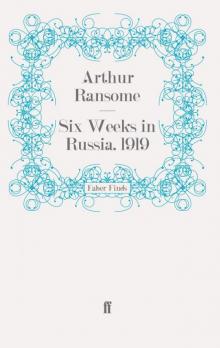 Six Weeks in Russia, 1919
Six Weeks in Russia, 1919 Secret Water
Secret Water The Big Six
The Big Six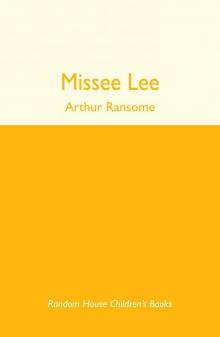 Missee Lee
Missee Lee Peter Duck
Peter Duck The Picts and the Martyrs
The Picts and the Martyrs